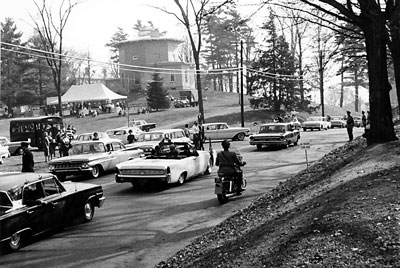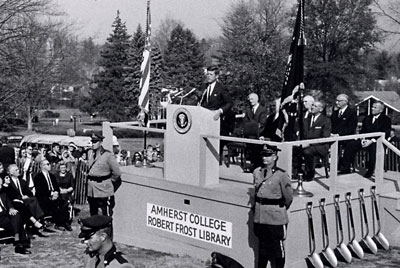By Peter Rooney
The photos are atmospheric, historic and dramatic, some in color, some in black and white, capturing the historic day on Oct. 26, 1963, when President John F. Kennedy visited Amherst College to receive an honorary degree and preside over the groundbreaking for the Robert Frost Library.

President Kennedy with Calvin H. Plimpton ‘39, then president of Amherst College
Frost, who had taught at Amherst for decades and whose poetry Kennedy frequently quoted in his speeches, had been the first poet to read at a Presidential Inauguration. He had died earlier in the year, and Kennedy’s words on that fall day honored not only Frost and the important role that arts and culture play in society, but also the obligation that graduates of elite colleges such as Amherst have to serve society.
“It was a huge event in the history of the college,” said Michael Kelly, director of Archives and Special Collections at Amherst and curator of two exhibitions, one at the college, one online, that commemorate Kennedy’s visit to campus. “How many colleges get a sitting president to come to their groundbreaking ceremony?”

The presidential motorcade approaches campus
To mark the 50th anniversary of Kennedy’s historic visit, in which he delivered what historians consider to be his last major speech before his assassination less than a month later, the college’s Frost Library has prepared an online exhibition, called “The President and The Poet,” as well a display of photographs and mementos on the library’s Mezzanine level.
An exhibition reception on Saturday, Oct. 26 will take place from 3 to 5 p.m. in the library’s Friendly Reading Room, with a viewing of the speech and gallery talk by family members of Robert Sargent Fay '56, who took the color photographs in the exhibition.
Kennedy had been invited to Amherst by John McCloy ’16, an influential adviser and a college trustee. The exhibition includes programs from the events, and pages from the speech itself, with handwritten notes by Kennedy, black and white photographs taken by college staff and color photographs taken by Fay.

Kennedy at the groundbreaking for Frost Library
The photographs leave no doubt about what a major event the speech was for the college. They include images of helicopters landing on Memorial Field; bulky television cameras on platforms at the Cage gymnasium; Amherst students carrying signs that proclaimed support for Kennedy’s Civil Rights program; and Kennedy in the back seat of a car with Calvin H. Plimpton ‘39, then president of Amherst College.
Edward “Ted” Plimpton, a son of President Plimpton, was 11 at the time and is an Amherst-based psychologist. He has many memories of that day, from the President’s house being surrounded by Secret Service agents, to a phone installed there with a direct line to the White House. But it was what Kennedy said to the boy at the end of his visit that resonated most.
“As he was leaving Amherst he turned to me on the steps of the President’s house and said, ‘Young man, we have great hopes for you,'” Plimpton recalled. “Then he popped into his car and off he went.”
Earlier in the day, as many as 10,000 people had visited campus.
“It was a huge crowd and a media circus,” Kelly said. “We have all the press passes where the cameras were allowed to set up. There was a lot of participation by Amherst students as well. I’ve met many alumni who say, ‘I stood right next to JFK.’”
Kelly’s favorite image in the exhibition is of a group of well-dressed students carrying signs in support of civil rights, significant because it foreshadowed an era of activism not only at Amherst but on campuses nationwide.

Amherst students with signs supporting Kennedy on civil rights
“These are guys at an elite college standing up in favor of civil rights,” Kelly said. “This is Mad Men, pre-hippie civil rights, with very serious young men about to embark upon amazing careers.”
Kennedy’s convocation speech that day (he also spoke at the groundbreaking; the text of both speeches can be read here, and listened to here), is frequently cited. Two quotations from it are carved in stone at the Kennedy Center for the Performing Arts in Washington, D.C., and his Amherst speech also is quoted on the website of the National Endowment for the Arts, which was established by President Lyndon Johnson in 1965.
Though it didn't really resonate with him at age 11, Plimpton said he's carefully read Kennedy's speech several times since his visit to campus 50 years ago. The phrase that's remained with him all these years?
With no hesitation, Plimpton recited:
"When power corrupts, poetry cleanses."